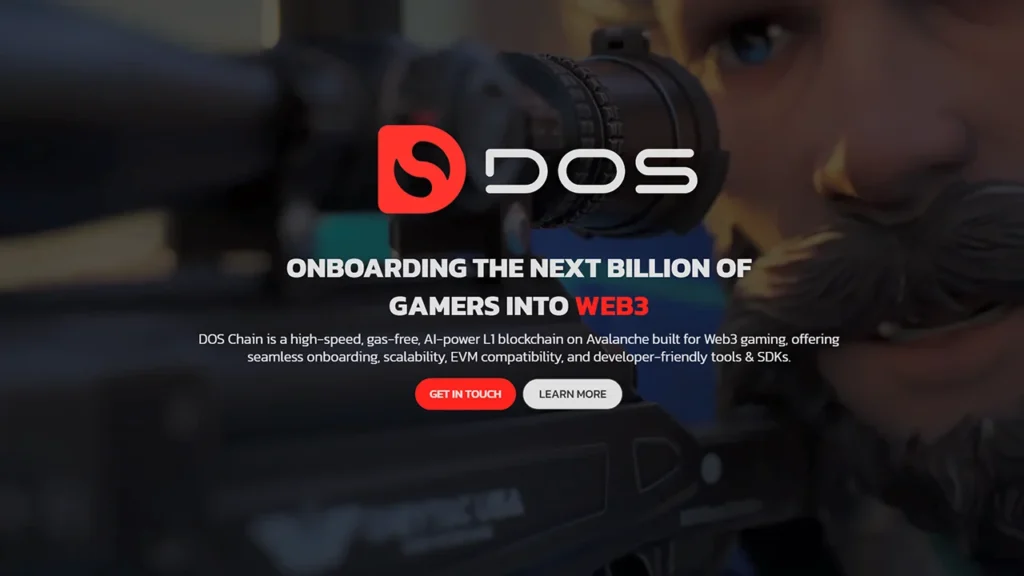Quick Take
- DOS Chain runs on Avalanche and supports real-time gameplay with gasless, sub-second finality
- The ecosystem includes SDKs, AI tooling, and OverMint, a purpose-built gaming NFT marketplace
- MetaDOS battle royale is live; more games and dev grants are rolling out in coming months
DOS Chain wants to make blockchain gaming feel like gaming again.
It’s a custom Avalanche subnet built for zero-gas, high-speed gameplay where players can log in with a social account, drop into a match, and never once think about seed phrases or gas fees. But under the hood, it’s still fully Web3: assets are owned, identities persist across games, and developers have full control over what goes on-chain.
We spoke with the team behind DOS Chain about how it all came together, what MetaDOS taught them about performance, and why the next phase of Web3 gaming might finally look like the games people actually want to play.
Why DOS Needed Its Own Chain
“The biggest problems in Web3 gaming were always gas and latency,” the team said. “You can’t build a real-time shooter or MMO on a chain that takes 10 seconds to settle.”
DOS Chain was launched as a custom Avalanche subnet to fix that. By stripping down the stack and optimizing for gaming workloads, it runs with sub-second finality and zero transaction fees for players. Developers don’t have to limit interactivity. Players don’t have to pause for confirmations.
What makes it work, they explained, is selective smart contract whitelisting, efficient validator incentives, and infrastructure-side monetization. Not every contract is free. But the core gameplay experience can be, and that’s what matters to users.
MetaDOS Proves the Model
The team’s first live game, MetaDOS, launched earlier this year. The battle royale is built natively on DOS Chain, designed to test the performance promises in real-world conditions. The results were clear: multiplayer gameplay synced smoothly, transactions cleared instantly, and most players onboarded without ever touching a traditional wallet.
“We learned a lot from MetaDOS,” the team said. “It showed how important seamless onboarding is, and how tightly game logic and chain performance need to be integrated.”
Their answer to wallet friction is DOSafe, a smart wallet system with social login, no seed phrases, and full Web3 ownership under the hood. It’s not invisible, it’s just intuitive enough that players don’t think about it.
From Assets to Identity
Where DOS gets interesting is in how it handles interoperability. DOS.me gives players a persistent identity that links their inventory, achievements, and currency balances across the entire ecosystem. Players can earn in one game and spend in another or just keep their character history intact between genres.
“We don’t think interoperability means your gun from Game A should work in Game B,” they said. “But your profile, your currency, your reputation, all that should absolutely travel with you.”
They’ve already integrated tools like LayerZero (for cross-chain transfers), Openfort (for wallet abstraction), and Stardust (for managing player inventories) to make that happen.
The Role of AI in DOS Games
Developers on DOS are already using AI it to power smart NPCs, run dynamic game economies, and generate real-time content. Future updates will bring AI-powered smart contracts and analytics that let games adapt on the fly. Ranging from balancing items to predicting market activity.

Games on DOS Chain will use AI to adapt in real time,” the team said. “We’re enabling systems that can respond to players and operate intelligently across gameplay and backend logic.
They also expect AI to play a role in user-generated content, enabling players to create games or assets inside DOS without needing to write code.
OverMint and What Comes Next
The DOS ecosystem is anchored by OverMint, a native NFT marketplace optimized for in-game assets. It supports real-time minting, batch listings, and game engine integrations making it easier for developers to handle assets tied to progression, character upgrades, and seasonal content.
The aim is have infrastructure for trading and evolving assets without interrupting gameplay.
With MetaDOS live and more titles in development, DOS is now shifting focus to third-party developers. The Game Studio Alliance is expanding, grant programs are active, and new tools are rolling out for Unity and Unreal Engine teams.
Over the next few months, the team will launch DOSafe wallets with full social login, expand OverMint’s cross-chain support, and ship updates to validator infrastructure and analytics. More first-party experiments are on the way, but the long-term goal is external dev adoption.
We’re building infrastructure for others to launch games,” the team said. “That’s the core focus now.







